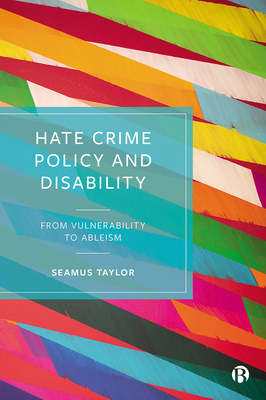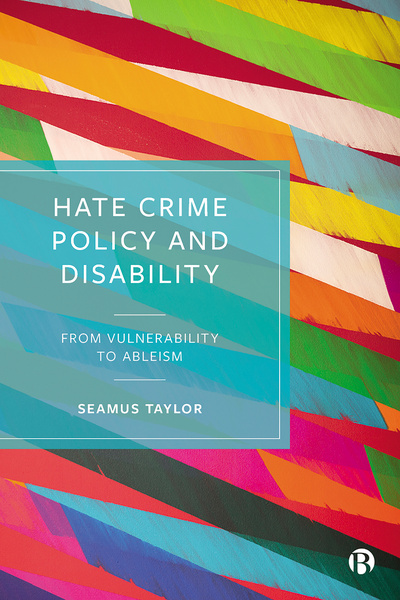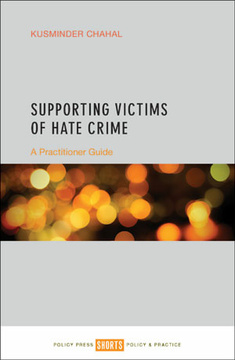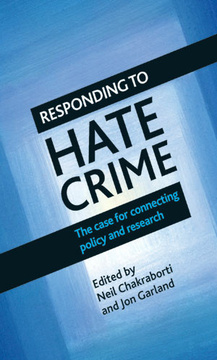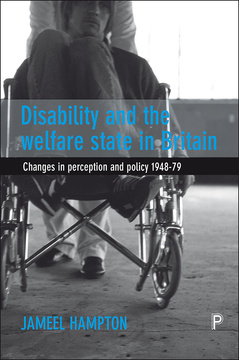Published
12 Mar 2024Page count
262 pagesISBN
978-1529217889Imprint
Bristol University PressPublished
26 Sep 2022Page count
262 pagesISBN
978-1529217872Dimensions
234 x 156 mmImprint
Bristol University PressPublished
26 Sep 2022Page count
262 pagesISBN
978-1529217896Imprint
Bristol University PressPublished
26 Sep 2022Page count
262 pagesISBN
978-1529217896Imprint
Bristol University PressOutlining the key developments of the Disability Hate Crime policy agenda, Seamus Taylor brings together a unique consideration of the theoretical and practical questions at its heart. This book analyses the contributions of activists, politicians, policymakers and criminal justice system practitioners to policy development, and critiques both the under-recognition of disability prejudice fuelled by ableism and the challenge of vulnerability in addressing disability hostility.
Concluding that a critically reflective approach on the part of policymakers and practitioners can lead to progress, the author gives clear policy recommendations to address current challenges in the criminal justice system.
"Compelling and rich in evidence, this timely new book challenges us to question prevailing assumptions about Disability Hate Crime. Essential reading for anyone seeking to develop fresh ways of thinking about and responding to an urgent set of problems." Neil Chakraborti, Professor of Criminology, University of Leicester
"Taylor provides a clear, comprehensive and compelling account of the development of policy on Disability Hate Crime – a go to text for scholars, policymakers and practitioners." Rt Hon Lord David Blunkett, former Home Secretary
"Taylor draws on his unique experiences as a policymaker and scholar to help us understand the true nature of Disability Hate Crime and why it really matters. Essential reading for anyone interested in ensuring justice for disabled people." Joanna Perry, Independent Consultant (Hate Crime) and former Hate Crime Advisor, OSCE, Warsaw
“This must-read book provides original insight into the policy progress made, or lack thereof, in tackling Disability Hate Crime. It implores the reader to reconsider how ableism informs this odious form of victimization.” Mark Walters, Professor of Criminal Law and Criminology, University of Sussex
"Brilliant and timely, this compelling account of an under-explored area is a passionate call to arms. Taylor lays bare the real meaning of these crimes and of society’s continuing failure to address them. His book is a demand for justice." Ken Macdonald QC, former Master of Wadham College, Oxford University and Director of Public Prosecutions 2003–8
“This book is long overdue: a welcome account of the development of Disability Hate Crime and a timely challenge about the way forward.” Sir Keir Starmer QC MP
"Taylor has been at the centre of Disability Hate Crime policy development for some years. He is ideally placed to describe this journey and, most importantly, the action that is still needed to provide equitable rights and protections to disabled people." Paul Giannasi OBE, National Policing Advisor for Hate Crime, HM Government
“For the first time, this book effectively combines the historical context of activism, political obliviousness and a need for recognition of the victims of these heinous crimes.” David Wilkin, The Open University and Disability Hate Crime Network
"The strength of this book lies in Taylor's exploration of how Disability Hate Crime evolved in the UK context. It successfully clarifies the dilemmas faced by those challenging the violence that seeps from society's discomfort with disability as a category." Katharine Quarmby, author of Scapegoat: How We Are Failing Disabled People
“Grounded in interviews with disability activists, policymakers and practitioners, this book highlights the limited recognition of targeted violence that is part of the lived experience of people with disability. Taylor acknowledges ableism as a foundational enabler of such violence.” Barbara Perry, UNESCO Chair in Hate Studies, Ontario Tech University
Seamus Taylor is Head of Department in Applied Social Studies at Maynooth University, Ireland and previously Director of Equality and Diversity at the Crown Prosecution Service (England and Wales) and prior to that Director of Strategy at the Commission for Racial Equality (Britain).
1. Introduction
2. Fifteen Cases of Disability Hate Crime
3. From Hate Crime to Disability Hate Crime
4. Agenda Triggering
5. Agenda Development
6. Towards Agenda Institutionalization?
7. Problem with the Current Agenda: The Focus on Vulnerability
8. An Agenda Item Yet to Fully Speak Its Name: Ableism and Disability Hate Crime
9. Conclusion
Appendix: Research Design and Methods







